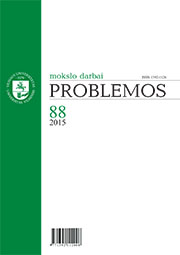POSTMETAFIZINĖS UNGRUND PRINCIPO PRIELAIDOS SCHELLINGO LAISVĖS FILOSOFIJOJE
POSTMETAPHYSICAL ASSUMPTIONS OF UNGRUND PRINCIPLE IN SCHELLING’S PHILOSOPHY OF FREEDOM
Author(s): Brigita Gelžinytė, Tomas SodeikaSubject(s): Philosophy, Metaphysics, Contemporary Philosophy, German Idealism
Published by: Vilniaus Universiteto Leidykla
Keywords: Ungrund;ontotheology;postmetaphysical thinking;freedom;will;
Summary/Abstract: During the last decades, as the revival of German classical philosophy has been noticed in the fields of academic philosophy, the ideas of J. F. W. Schelling are being significantly reconsidered. The dominant schema, according to which Schelling is identified as one of the modern metaphysical thinkers whose philosophy is interpreted in the light of German idealism leaving him only as a transitory figure between Fichte and Hegel, has become highly disputable. The article claims that the concept of “Ungrund”, which is presented in Schelling’s treatise Philosophical Inquiries into the Essence of Human Freedom, reveals horizons of post-metaphysical thinking. By assuming the metaphysics as ontotheology and reconsidering contemporary post-idealistic interpretations of Schelling (Tritten, Freydberg, Bowie), the concept of “Ungrund” is presented as a structural inversion of ontotheology through a ternary scheme, i.e. by re-evaluating it from three different perspectives: τὸ ὄν, Θεός and λόγος.
Journal: Problemos
- Issue Year: 2015
- Issue No: 88
- Page Range: 44-53
- Page Count: 10
- Language: Lithuanian

